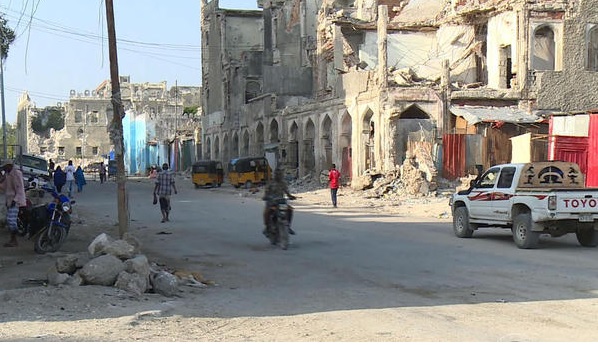By Liban Ahmad
” The politics [is] the activity by which differing interests within a given unit of rule are conciliated by giving them a share in power in proportion to their importance to the welfare and the survival of the whole community” In Defence of Politics by Bernard Crick
One of the most instructive lessons Somalis have learned since 1991, when the state collapsed after the ouster of the military dictatorship, is that politicians at different levels have impact on their lives. State collapse meant emergence of political classes, who retreated into their strongholds. What can Somalis do to move politics from the stage of identity to a level based on citizenship and political programmes of parties or political associations?

This is by no means a simple task given the absence of a history of a strong civil society in post-colonial Somalia. The first nine years of parliamentary democracy in Somalia was not enough to nurture a civil society able to withstand twenty-plus years of military dictatorship.
Our founding fathers of all political persuasions promoted free speech to enable the efflorescence of free press such as Dalka (edited by Yusuf J. Duhul), La Tribuna (edited by Ismail Jimale) and other publications. Somalia was a country known for parliamentary democracy and free press — a rare accomplishment in a country that gained independence in 1960. Our first generation of post-colonial leaders created nascent democratic institutions in the absence of citizenry steeped in democratic practice. It was a democracy by the elite and for the elite.
Somalia cannot afford to repeat the pre-1969 democratic experiment in an era where we have more educated people in a country redefined by state collapse. Somali citizens debate which form of governance best suits the nation state. The progress made in getting Somali political leaders to work with each other since the year 2000, cannot be brushed aside. However, Somali political classes remain in their comfort zones: they are keen to be identified with regions or clan constituencies instead of ideas. Their political outlooks have ramifications for efforts to reintroduce multi-party politics fifty years after a military junta had overthrown a civilian government.

More than five political parties have registered with the National Independent Electoral Commission (NIEC) in Mogadishu. This is a welcome move, but an incomplete milestone. Since 2000 the power-sharing system Somalia’s major clans adopted relegates almost half of Somalis to a minority status. Known as ‘Others’ Somali social groups placed under 0.5 category exercise less political and economic rights in any part of Somalia. Economic and political inequalities exacerbate mistrust if our political institutions remain wedded to a system that does not put emphasis on political accountability. We cannot move forward if citizenship rights are ranked below one’s clan identity despite Heritage Institute for Policy Studies hailing “the country’s weak but steady march towards a new democratic culture…”
Somalis classed as minorities disproportionately constitute the largest number of IDPs. Their territories of origin, the most arable in Somalia, remain occupied by armed militias from non-minority clans. Identification of a Somali territory with a clan ownership is more pronounced than it was before 1991. This trend affects a Somali person’s life chances if he/she can not belong to a federal member state or if he/she belongs to a minatory clan. The 4.5 power-sharing system has deepened political and economic inequalities in Somalia. In fact it is a power-depriving mechanism given how rights of Somali minorities are violated.
Coalition politics for parties with political programmes could be the way out of this deadlock. If political parties are organised along clan or religious and economic interest lines, politicians’ goal will be to capture the state. That is why the rush to form political parties before testing their mettle as political associations poses formidable challenges to efforts to conduct one person, one vote poll in Somalia in 2021.
The incumbent Federal Government has run out of steam after celebrating its second anniversary. There is no inclusive national army. The slow progress towards professionalising the Somali National Army is another barrier to one person, one vote poll in addition to the infiltration of Somali security forces in the capital by Al-shabaab operatives whom the Federal Government categorises as “low risk”.
The picture that emerges will get gloomier if one takes the rivalry of Gulf countries on the Somali soil into account. Gulf money has been used to influence election results in Somalia. Qatar funds projects in southern Somalia whereas UAE funds projects in Puntland and Somaliland.
The 4.5 power-sharing system emerged in 2000 at the Djibouti-sponsored reconciliation conference at Arta district. It has been a basis for two transitional governments (Transitional National Government and Transitional Federal Government) and two permanent governments (2012-2017 and 2017- 2021, if the term of the incumbent government does not get extension).
It is time for Somali parties and political associations to throw the gauntlet to each other to see which party can come up with ideas to boost citizenship in a country whose powerful clans agreed to marginalise their compatriots, who do not have armed clan militias and who do not “own” a federal member state.
Liban Ahmad
Email:[email protected]
We welcome the submission of all articles for possible publication on WardheerNews.com. WardheerNews will only consider articles sent exclusively. Please email your article today . Opinions expressed in this article are those of the author and do not necessarily reflect the views of WardheerNews.
WardheerNew’s tolerance platform is engaging with diversity of opinion, political ideology and self-expression. Tolerance is a necessary ingredient for creativity and civility.Tolerance fuels tenacity and audacity.
WardheerNews waxay tixgelin gaara siinaysaa maqaaladaha sida gaarka ah loogu soo diro ee aan lagu daabicin goobo kale. Maqaalkani wuxuu ka turjumayaa aragtida Qoraaga loomana fasiran karo tan WardheerNews.
Copyright © 2024 WardheerNews, All rights reserved


